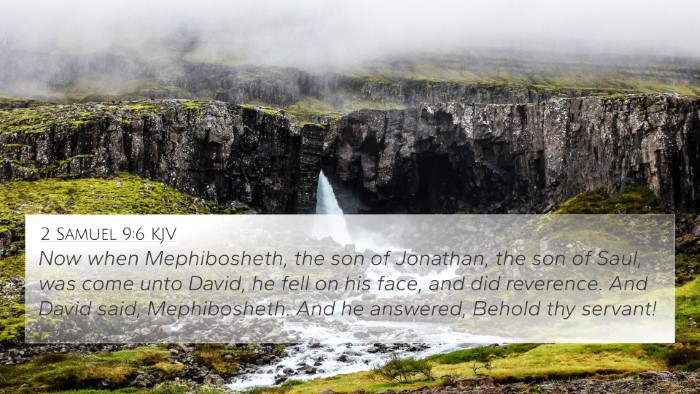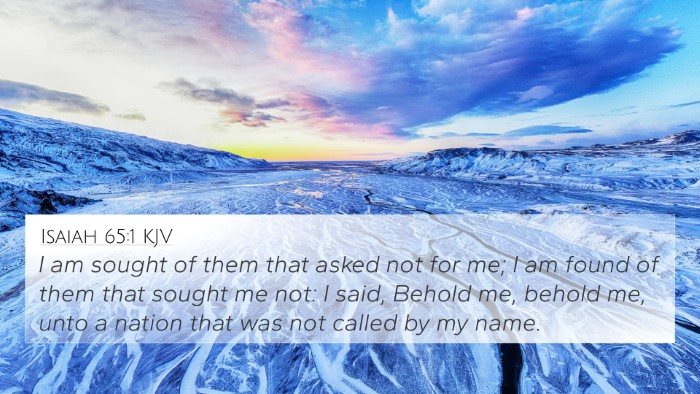Understanding 2 Samuel 1:7
2 Samuel 1:7 reads:
"And when he looked behind him, he saw me, and called unto me. And I answered, Here am I."
Overview of the Verse
This verse is part of the narrative detailing the aftermath of Saul's death, where a young Amalekite claims to have killed Saul, thus attempting to gain favor with David. The young man's encounter with David and his admission potentially display both his misguided perception and his fear of the reality of Israel’s loss. The verse also illustrates a moment of vulnerability for David, as well as the young man's desperation for validation and survival.
Key Themes and Insights
- Vulnerability in Leadership: David's response to the Amalekite's claim illustrates the uncertainty and challenge of leadership, especially at a time of national loss.
- Misguided Ambition: The young man's desire to gain favor through dishonest means speaks to the theme of integrity versus ambition.
- Fear of Retribution: The context of the young man's actions reflects a deep fear of retribution from David, knowing the sacredness of Saul's position.
Commentary Insights
Drawing on various public domain commentaries:
Matthew Henry's Commentary
Henry reflects on the Amalekite's desire for recognition as a key motivation behind his action. He emphasizes the tragic irony of his claim, as he miscalculates David's reception of his news of Saul's death. David, instead of rewarding the Amalekite, sees the act as treachery against God's anointed and ultimately has him executed.
Albert Barnes' Notes
Barnes elucidates the consequences of the Amalekite's lie, suggesting that the young man's ambition blinds him to the reality of David's perspective on Saul. Barnes emphasizes how David’s reaction illustrates a broader understanding of leadership and divine appointment, wherein even a king's mourning must take precedence over personal gain.
Adam Clarke's Commentary
Clarke points out that the Amalekite came to David in a moment of hope, only to find that David’s heart was with his fallen king. Clarke highlights the moral implications of the narrative, stressing that treachery yields no reward, and underscores the gravity of blaspheming God’s anointed ones.
Cross References
This verse can be linked to several other biblical passages that provide additional insights and thematic connections:
- 1 Samuel 24:6: David spares Saul’s life, showcasing his respect for God's anointed.
- 2 Samuel 1:14: David questions the Amalekite about his actions, reinforcing the importance of divine authority.
- 1 Chronicles 10:14: Discusses Saul's demise and David’s rightful sorrow over the loss.
- Romans 13:1: Highlights the overarching theme of submission to authorities established by God.
- 1 Samuel 26:9: David refrains from harming Saul, illustrating the theme of mercy over malice.
- Matthew 5:7: "Blessed are the merciful," directly contrasting the Amalekite's intentions.
- 1 Peter 2:17: Encourages respect for all, connecting to the respect David holds for Saul.
Conclusion
In summary, 2 Samuel 1:7 serves not only as a reflection on a moment of tension between David and an outsider but also brings forth themes of moral integrity, respect for leadership, and the consequences of treachery. The verse encourages readers to contemplate the depth of their ambitions and the weight of their actions in the context of their morality and faith.
Additional Study Tools
For those interested in a deeper exploration of biblical context, utilizing bible concordances and bible cross-reference guides will enhance understanding:
- Bible cross-reference system: Helps identify connections between scripture.
- Tools for Bible cross-referencing: Such as thematic studies to see how 2 Samuel 1:7 interacts with broader biblical themes.
- Cross-referencing Bible study methods: Can reveal layered meanings in these narratives.
- Comprehensive resources: Available for deeper genealogical and thematic studies, enriching one’s understanding of the scripture.







